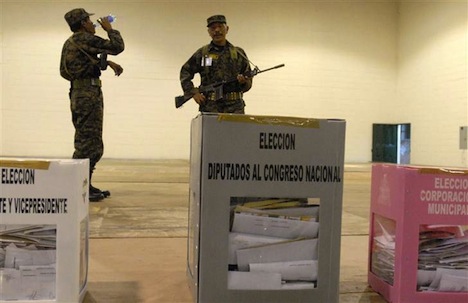TEGUCIGALPA — In the shadow of the June 2009 coup that ousted leftist president Manuel Zelaya from office, Hondurans will vote on Sunday to determine whether Zelaya’s wife, Xiomara Castro de Zelaya will become the Central American country’s new president.![]()
Despite a polarizing three-way campaign that pits the Zelayas against the two traditional Honduran political parties, with stark divisions over economic and security policy, how secure can Honduras and the region be that the vote will be essentially free and fair — and that the ballots will be counted fairly?
Candidates on both the left and the right bluster that they don’t fear electoral fraud, confident that their mandate will be strong enough for a clear victory. But though international observers and representatives from each of Honduras’s political parties will be on hand to observer the counting on Sunday, there remains a nagging fear that a narrow election victory by any of the major presidential candidates would cause a political crisis, given the low level of public trust in Honduran public institutions. Recently, U.S. congressmen Raúl M. Grijalva, Mike Honda and Hank Johnson wrote a letter to Secretary of State John Kerry warning of possible fraud:
“We are particularly alarmed to learn that the ruling party, and its presidential candidate Mr. Juan Orlando Hernández, now dominates all the key institutions of the government, including the country’s electoral authority and the military, which distributes the ballots,” they wrote, “leaving scarce recourse for Honduran citizens should fraud be committed in the electoral process, or human rights violations continue to threaten open debate. This is particularly troubling given the long history of electoral fraud in Honduras, including allegations of widespread fraud during the primary elections in November of 2012.”
In those primary elections, Hernández narrowly defeated popular Tegucigalpa mayor Ricardo Álvarez for the presidential nomination of the conservative National Party, but refused to brook the ballot recount that Álvarez’s campaign requested. Though the two candidates have long since united, no one can say with certainty that Hernández actually won the vote, and that’s left some doubt about the capacity of the Supreme Electoral Tribunal (TSE) to guarantee ballot sanctity in Sunday’s general elections.
Though Central America isn’t necessarily always on the front pages, Honduras’s election is especially important to the United States. The 2009 coup was one of the first foreign policy crises for U.S. president Barack Obama, and the United States has devoted increasing military aid in the attempt to combat drug trafficking in Honduras. Moreover, Honduras’s general election is the first of four that will be held over the next six months in Central America – El Salvador, Costa Rica and Panama will all choose new presidents between now and May 2014.
Dr. Leo Valladares, a former Honduran commissioner of human rights and a former member of the Inter-American Commission on Human Rights, agreed with the warnings about potential ballot abuse. “There are possibilities for fraud,” Valladares admitted. “In theory, the National Party could win without fraud. But they’re not secure, so they might commit fraud. Whatever the outcome of the election, it will be very conflicted.”
Hernández’s chief rivals in Sunday’s vote are Mauricio Villeda, the candidate of the more centrist Liberal Party, a Tegucigalpa attorney and the son of former president Ramón Villeda Morales (1975-63), and Castro de Zelaya who, with her husband, left the Liberal Party to form the new leftist Party of Liberty and Refoundation (LIBRE) in 2011.
Jacobo Hernández Cruz, a former vice president and former TSE head, however, argued that over the past decade, Honduran electoral authorities have made great strides toward enhancing electoral transparency.
“The only way there can be fraud [previously] is in null votes,” Hernández said. “But now when they count, everyone can see. This has been the case for eight years. Open doors and open windows, everyone can see. It’s out in public.”
Historically, transparency and observation of the vote count represents the greatest check against vote fraud in Honduran elections. But other concerns remain, especially over how the ballot boxes arrive to the polling stations.
“The boxes come with the electoral custodian,” Hernández said. “The armed forces bring them. There is always trust in the armed forces. The ballots are going to be scanned. There’s a procedure for how this will be done.” Continue reading Will the Honduran general election be conducted fairly?
